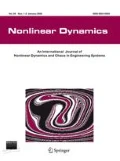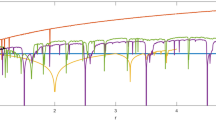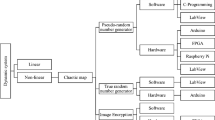Abstract
Since chaos theory related to cryptography has been addressed widely, many chaotic maps based two-party password-authenticated key agreement (2PAKA) schemes have been proposed. However, to the best of our knowledge, no chaotic maps based three-party password-authenticated key agreement (3PAKA) protocol without using a timestamp has been proposed, yet. In this paper, we propose the first chaotic maps-based 3PAKA protocol without a timestamp. The proposed protocol is not based on the traditional public key cryptosystem but is based on chaotic maps, which not only achieves perfect forward secrecy without using a timestamp, modular exponentiation and scalar multiplication on an elliptic curve, but is also robust to resist various attacks such as password guessing attacks, impersonation attacks, man-in-the-middle attacks, etc.

Similar content being viewed by others
References
Baptista, M.S.: Cryptography with chaos. Phys. Lett. A 240, 50–54 (1998)
Özkaynak, F., Yavuz, S.: Designing chaotic S-boxes based on time-delay chaotic system. Nonlinear Dyn. (2013). doi:10.1007/s11071-013-0987-4
Behnia, S., Akhshani, A., Ahadpour, S., Mahmodi, H., Akhavan, A.: A fast chaotic encryption scheme based on piecewise nonlinear chaotic maps. Phys. Lett. A 366, 391–396 (2007)
Hussain, I., Shah, T., Gondal, M.: A novel approach for designing substitution-boxes based on nonlinear chaotic algorithm. Nonlinear Dyn. 70, 1791–1794 (2012)
Hussain, I., Shah, T., Gondal, M., Mahmood, H.: An efficient approach for the construction of LFT S-boxes using chaotic logistic map. Nonlinear Dyn. 71, 133–140 (2013)
Khan, M., Shah, T., Mahmood, H., Gondal, M.: An efficient method for the construction of block cipher with multi-chaotic systems. Nonlinear Dyn. 71, 489–492 (2013)
Xiao, D., Liao, X., Wong, K.: An efficient entire chaos-based scheme for deniable authentication. Chaos Solitons Fractals 23, 1327–1331 (2005)
Alvarez, G.: Security problems with a chaos-based deniable authentication scheme. Chaos Solitons Fractals 26, 7–11 (2005)
Xiao, D., Liao, X., Deng, S.: A novel key agreement protocol based on chaotic maps. Inf. Sci. 177, 1136–1142 (2007)
Han, S.: Security of a key agreement protocol based on chaotic maps. Chaos Solitons Fractals 38, 764–768 (2008)
Xiang, T., Wong, K., Liao, X.: On the security of a novel key agreement protocol based on chaotic maps. Chaos Solitons Fractals 40, 672–675 (2009)
Xiao, D., Liao, X., Deng, S.: Using time-stamp to improve the security of a chaotic maps-based key agreement protocol. Inf. Sci. 178, 1598–11602 (2008)
Han, S., Chang, E.: Chaotic map based key agreement with/out clock synchronization. Chaos Solitons Fractals 39, 1283–1289 (2009)
Guo, X., Zhang, J.: Secure group key agreement protocol based on chaotic Hash. Inf. Sci. 180, 4069–4074 (2010)
He, D.: Cryptanalysis of a key agreement protocol based on chaotic Hash. eprint.iacr.org/2011/333.pdf
Gong, P., Li, P., Shi, W.: A secure chaotic maps-based key agreement protocol without using smart cards. Nonlinear Dyn. 70, 2401–2406 (2012)
Tseng, H., Jan, R., Yang, W.: A chaotic maps-based key agreement protocol that preserves user anonymity. In: IEEE International Conference on Communications (ICC09), pp. 1–6 (2009)
Niu, Y., Wang, X.: An anonymous key agreement protocol based on chaotic maps. Commun. Nonlinear Sci. Numer. Simul. 16(4), 1986–1992 (2011)
Xue, K., Hong, P.: Security improvement on an anonymous key agreement protocol based on chaotic maps. Commun. Nonlinear Sci. Numer. Simul. 17, 2969–2977 (2012)
Yoon, E.: Efficiency and security problems of anonymous key agreement protocol based on chaotic maps. Commun. Nonlinear Sci. Numer. Simul. 17, 2735–2740 (2012)
Tan, Z.: A chaotic maps-based authenticated key agreement protocol with strong anonymity. Nonlinear Dyn. 72, 311–320 (2013)
Lee, C., Hsu, C.: A secure biometric-based remote user authentication with key agreement scheme using extended chaotic maps. Nonlinear Dyn. 71, 201–211 (2013)
Guo, C., Chang, C.C.: Chaotic maps-based password-authenticated key agreement using smart cards. Commun. Nonlinear Sci. Numer. Simul. (2012). doi:10.1016/j.cnsns.2012.09.032
Wang, X., Zhao, J.: An improved key agreement protocol based on chaos. Commun. Nonlinear Sci. Numer. Simul. 15, 4052–4057 (2010)
Yoon, E., Jeon, I.: An efficient and secure Diffie–Hellman key agreement protocol based on Chebyshev chaotic map. Commun. Nonlinear Sci. Numer. Simul. 16, 2383–2389 (2011)
Lai, H., Xiao, J., Li, L., Yang, Y.: Applying semigroup property of enhanced Chebyshev polynomials to anonymous authentication protocol. Math. Probl. Eng. (2012). doi:10.1155/2012/454823
Zhao, F., Gong, P., Li, S., Li, M., Li, P.: Cryptanalysis and improvement of a three-party key agreement protocol using enhanced Chebyshev polynomials. Nonlinear Dyn. (2013). doi:10.1007/s11071-013-0979-4
Lee, C., Li, C., Hsu, C.: A three-party password-based authenticated key exchange protocol with user anonymity using extended chaotic maps. Nonlinear Dyn. 73, 125–132 (2013)
Yang, J., Cao, T.: Provably secure three-party password authenticated key exchange protocol in the standard model. J. Syst. Softw. 85, 340–350 (2012)
Wu, S., Chen, K., Pu, Q., Zhu, Y.: Cryptanalysis and enhancements of efficient three-party password-based key exchange scheme. Int. J. Commun. Syst. (2012). doi:10.1002/dac.1362
Zhang, L.: Cryptanalysis of the public key encryption based on multiple chaotic systems. Chaos Solitons Fractals 37(3), 669–674 (2008)
Xiao, D., Shih, F., Liao, X.: A chaos-based hash function with both modification detection and localization capabilities. Commun. Nonlinear Sci. Numer. Simul. 15, 2254–2261 (2010)
Jansma, N., Arrendondo, B.: Performance comparison of elliptic curve and RSA digital signatures. http://www.nicj.net/files/performance_comparison_of_elliptic_curve_and_rsa_digital_signatures.pdf (2013/5/1)
Bergamo, P., D’Arco, P., Santis, A., Kocarev, L.: Security of public key cryptosystems based on Chebyshev polynomials. IEEE Trans. Circuits Syst. I 52, 1382–1393 (2005)
Kocarev, L., Lian, S.: Chaos-Based Cryptography: Theory, Algorithms and Applications, pp. 53–54. Springer, Berlin (2011)
Pareek, N.K., Patidar, V., Sud, K.K.: Discrete chaotic cryptography using external key. Phys. Lett. A 309, 75–82 (2003)
Li, Z., Cui, Y., Xu, H.: Fast algorithms of public key cryptosystem based on Chebyshev polynomials over finite field. J. China Univ. Post Telecommun. 18(2), 86–93 (2011)
Acknowledgements
This research was supported by National Natural Science Foundation of China (No. 61070153), the Major State Basic Research Development (973) Program of China (No. 2013CB834205), Natural Science Foundation of Zhejiang province (No. LZ12F02005), and Opening Fund of Top Key Discipline of Computer Software and Theory in Zhejiang Provincial Colleges at Zhejiang Normal University (No. ZSDZZZZXK35).
Author information
Authors and Affiliations
Corresponding author
Rights and permissions
About this article
Cite this article
Xie, Q., Zhao, J. & Yu, X. Chaotic maps-based three-party password-authenticated key agreement scheme. Nonlinear Dyn 74, 1021–1027 (2013). https://doi.org/10.1007/s11071-013-1020-7
Received:
Accepted:
Published:
Issue Date:
DOI: https://doi.org/10.1007/s11071-013-1020-7




